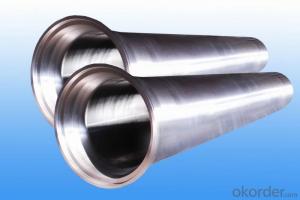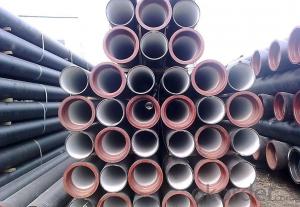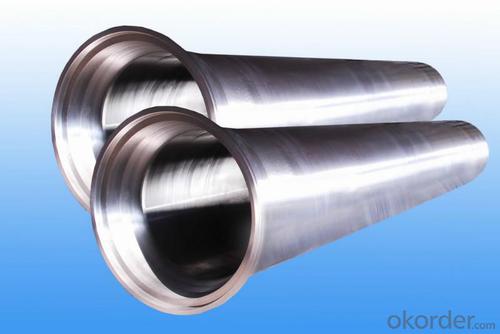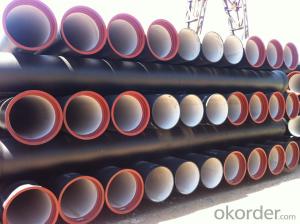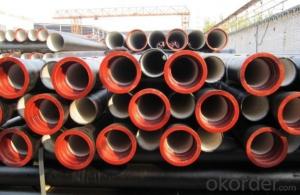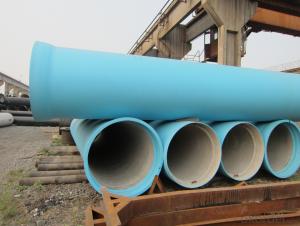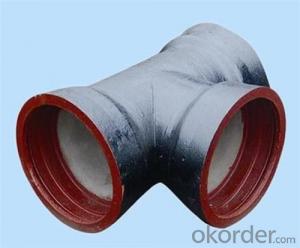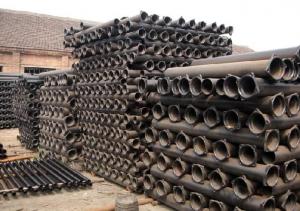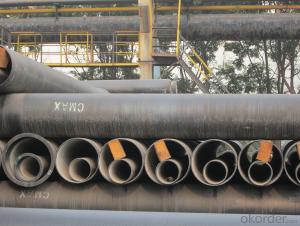Ductile Iron Pipe of China DN100 EN545 C25 Sanitary
- Loading Port:
- China main port
- Payment Terms:
- TT or LC
- Min Order Qty:
- 20 m.t.
- Supply Capability:
- 200000 m.t./month
OKorder Service Pledge
OKorder Financial Service
You Might Also Like
1,Ductile Iron Pipe Description :
1) Pipes confirm to ISO2531,K9 class,T type joint,6m long,with inside cements lining conform to ISO4179, outside Zinc spraying(130g/m2) and bitumen coating(70μm) conform to ISO8179.
2) Pipe ends: Spigot and socket ends, with 100% SBR rubber gaskets accoding to ISO4633
3) we can do third party inspection according to customer's request.
4) Our products have been sold to many international market,such as Middle East and South East Asia and Africa.
2,Main Features of the Ductile Iron Pipe:
·High yield strength
·High tensile Strength
·High corrosion resistance
·Pressure Resistence
·Anti-corrosion
·Installation is convenient
·Satisfy the highest hygienic standards
3,Ductile Iron Pipe Images:
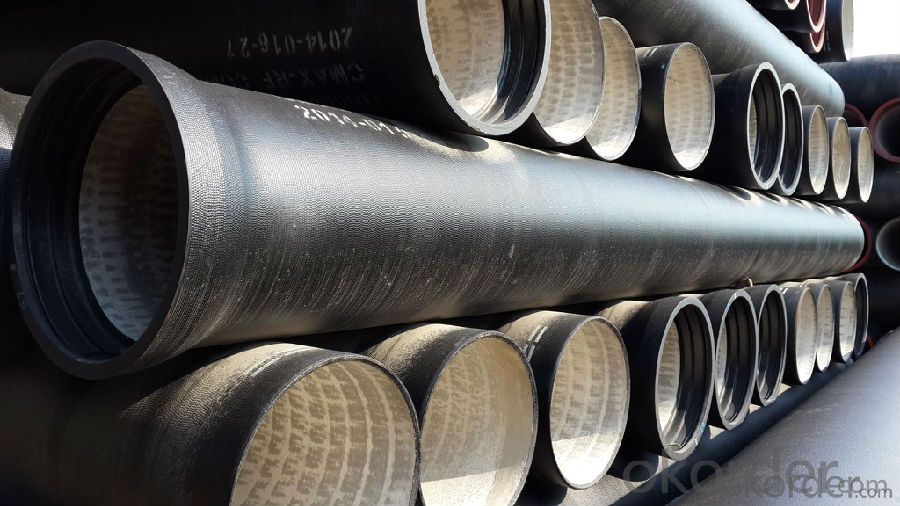
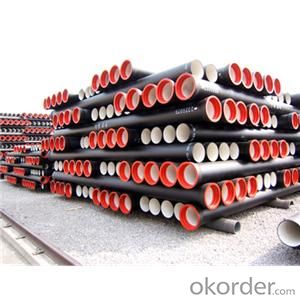
4. Ductile Iron Pipe Specification
Standard: API SPEC 5L 44th eidtion,ASTM A252-98(2007)
Grade: A53 Grades A/B, ASTM A106 Grades B/C,ASTM A179
AWWA, C200, ASTM A139, ASTM A120, API 5L Grade B
X42, X52, X56, X60, X65, X70, X80, X100
Weld Alternatives: LSAW
OD size range: 6.4~44.5mm
Wall thickness: 406.4~1422mm
Length: 3 - 12 m according to requirment
Note: Other grade can also be provided after consulting. Special design are available
for coal slurry conveyance LSAW line tube -- Service.
Internal lining: ductile iron pipes shall have an internal cement mortar lining in acc with ISO4179.
External coating: ductile iron pipes shall be externally coated with metallic zinc spray plus a further layer of resin painting to ISO8179.
Gasket: 100% SBR/NBR/EPDM rubber gasket in accordance with ISO4633.
Packing: ductile iron pipes from DN100 to DN300 be bundled with steel belts, others are in bulk.
Payment term: L/C, T/T.
Packing: In bulk vessel or in container
5.FAQ:
We have organized several common questions for our clients,may help you sincerely:
1.Q: Why would you choose ductile iron pipe rather than other pipe materials?
A:The reasons are obvious for that not only ductile iron pipe possesses the inherent strength and flexibility of ductile iron, combined with proven corrosion protection systems, but also the cost savings can be achieved from design to installation and commissioning.
2.Q:Why can you guarantee the inner of pipes can’t be corroded?
A: High alumina cement mortar lining and sulphate-resistant cement mortar lining. These two special linings are applicable to inner anti-corrosion for sewage pipes, improving resistance to erosion of the sewage components.
- Q: What are the different pressure classes available for ductile iron pipe?
- The different pressure classes available for ductile iron pipe include Class 100, Class 150, Class 200, Class 250, Class 300, Class 350, and Class 400.
- Q: What are the typical joint restraint requirements for ductile iron pipes?
- The typical joint restraint requirements for ductile iron pipes involve the use of mechanical joint restraints, such as thrust blocks or tie rods, to prevent the pipe from separating or moving under internal pressure or external forces. These restraints ensure the stability and integrity of the pipeline system.
- Q: Can ductile iron pipes be used for hydropower projects?
- Yes, ductile iron pipes can be used for hydropower projects. Ductile iron pipes are known for their durability, strength, and resistance to corrosion, which makes them suitable for various applications, including hydropower projects. They can handle high-pressure water flow, making them ideal for conveying water to turbines or other power generation equipment. Additionally, ductile iron pipes have a long lifespan, which reduces maintenance and replacement costs over time. Therefore, using ductile iron pipes in hydropower projects can contribute to the overall efficiency and reliability of the system.
- Q: Can ductile iron pipes be used for slurry transportation?
- Yes, ductile iron pipes can be used for slurry transportation. Ductile iron pipes are known for their high strength and durability, making them suitable for various applications including slurry transportation. Slurry is a mixture of solid particles and a liquid, which can be abrasive and corrosive. Ductile iron pipes have excellent resistance to abrasion, corrosion, and erosion, making them capable of handling the challenges posed by slurry transportation. Additionally, ductile iron pipes offer a smooth inner surface, reducing friction and improving the flow of slurry. Therefore, ductile iron pipes are a reliable choice for slurry transportation systems in industries such as mining, wastewater treatment, and oil and gas.
- Q: How does ductile iron pipe handle traffic loads and vibrations?
- Ductile iron pipe is known for its excellent strength and flexibility, allowing it to efficiently handle traffic loads and vibrations. Its superior durability and resilience enable it to withstand heavy vehicle traffic without experiencing significant deformation or damage. Additionally, the material's inherent vibration-damping properties help to minimize the transmission of vibrations caused by traffic, ensuring a smoother and quieter flow of traffic. Overall, ductile iron pipe is a reliable and robust choice for managing traffic loads and vibrations effectively.
- Q: Is the spigot and socket connection of the ductile iron tube reversed?
- The three pass joint is formed by flattening a tube blank larger than three through diameter to approximately three through the diameter and opening a hole at the point of the branch pipe;
- Q: What are some common applications for ductile iron pipe?
- Ductile iron pipe, known as DI pipe, is extensively utilized in a variety of applications because of its durability, strength, and ability to resist corrosion. The following are some common uses of ductile iron pipe: 1. Water Distribution: DI pipe is widely employed in the distribution of clean water. Its high tensile strength enables it to withstand high water pressure, making it perfect for water mains, water transmission lines, and water distribution networks. 2. Sewer Systems: DI pipe is commonly utilized in sewer systems because of its corrosion resistance and ability to handle heavy loads. It is often used for gravity sewer lines, force mains, and stormwater systems. 3. Industrial Applications: DI pipe is used in various industrial settings, such as power plants, chemical plants, and refineries. It is utilized for the transportation of water, wastewater, and other fluids in these industries. 4. Irrigation Systems: Due to its strength and long lifespan, DI pipe is suitable for irrigation systems, particularly in agricultural areas. It is used to transport water for irrigation purposes, ensuring efficient water distribution in fields and farms. 5. Fire Protection Systems: DI pipe is commonly employed in fire protection systems, including fire hydrants, fire sprinkler systems, and fire suppression systems. Its robustness and ability to withstand high pressure make it an excellent choice for reliable and effective fire protection. 6. Pumping Stations: DI pipe is frequently utilized in pumping stations, which are crucial for various water-related applications. It is used in water intake systems, wastewater pumping stations, and water treatment plants to efficiently transport water and wastewater. 7. Municipal Infrastructure: DI pipe is widely used in municipal infrastructure projects, such as road drainage systems, culverts, and bridge crossings. Its strength, durability, and ability to withstand external loads make it suitable for these applications. 8. Gas Distribution: Although primarily used for water-related applications, DI pipe is also utilized for the distribution of natural gas and other gases. It is preferred for gas distribution due to its resistance to corrosion and ability to withstand high-pressure environments. In conclusion, ductile iron pipe has a wide range of applications and is preferred in situations that require strength, durability, and resistance to corrosion. Its versatility and reliability make it a popular choice for various infrastructure projects and industrial applications.
- Q: Can ductile iron pipes be used for submarine pipelines?
- Yes, ductile iron pipes can be used for submarine pipelines. Ductile iron is known for its high strength and durability, making it suitable for various applications, including underwater installations. Ductile iron pipes have been successfully used in the construction of submarine pipelines for several decades. They can withstand the harsh conditions of underwater environments, such as corrosion, pressure, and shifting seabed. Additionally, ductile iron pipes have excellent resistance to external loading, making them ideal for submarine pipelines that need to withstand the weight of water and potential impacts. However, it is important to consider factors such as coating, cathodic protection, and proper installation techniques to ensure the long-term performance and integrity of the submarine pipeline.
- Q: Can ductile iron pipe be used in corrosive environments?
- Yes, ductile iron pipe can be used in corrosive environments. Ductile iron is known for its excellent corrosion resistance due to its protective oxide layer, making it suitable for various corrosive applications such as wastewater, chemical plants, and underground installations.
- Q: Can ductile iron pipes be used for wastewater treatment plants?
- Indeed, ductile iron pipes have proven to be a viable option for wastewater treatment plants. Renowned for their robustness and endurance, these pipes are well-suited to endure the challenging and corrosive conditions present in such facilities. They possess the ability to withstand elevated pressures and exhibit resistance against corrosion, which is crucial for effectively managing wastewater and the diverse range of chemicals utilized in the treatment procedure. Additionally, ductile iron pipes offer the advantage of being effortless to install and maintain, ensuring an extended period of service. Consequently, they are frequently utilized in wastewater treatment plants for the transportation and distribution of wastewater across the entirety of the establishment.
Send your message to us
Ductile Iron Pipe of China DN100 EN545 C25 Sanitary
- Loading Port:
- China main port
- Payment Terms:
- TT or LC
- Min Order Qty:
- 20 m.t.
- Supply Capability:
- 200000 m.t./month
OKorder Service Pledge
OKorder Financial Service
Similar products
Hot products
Hot Searches
Related keywords
